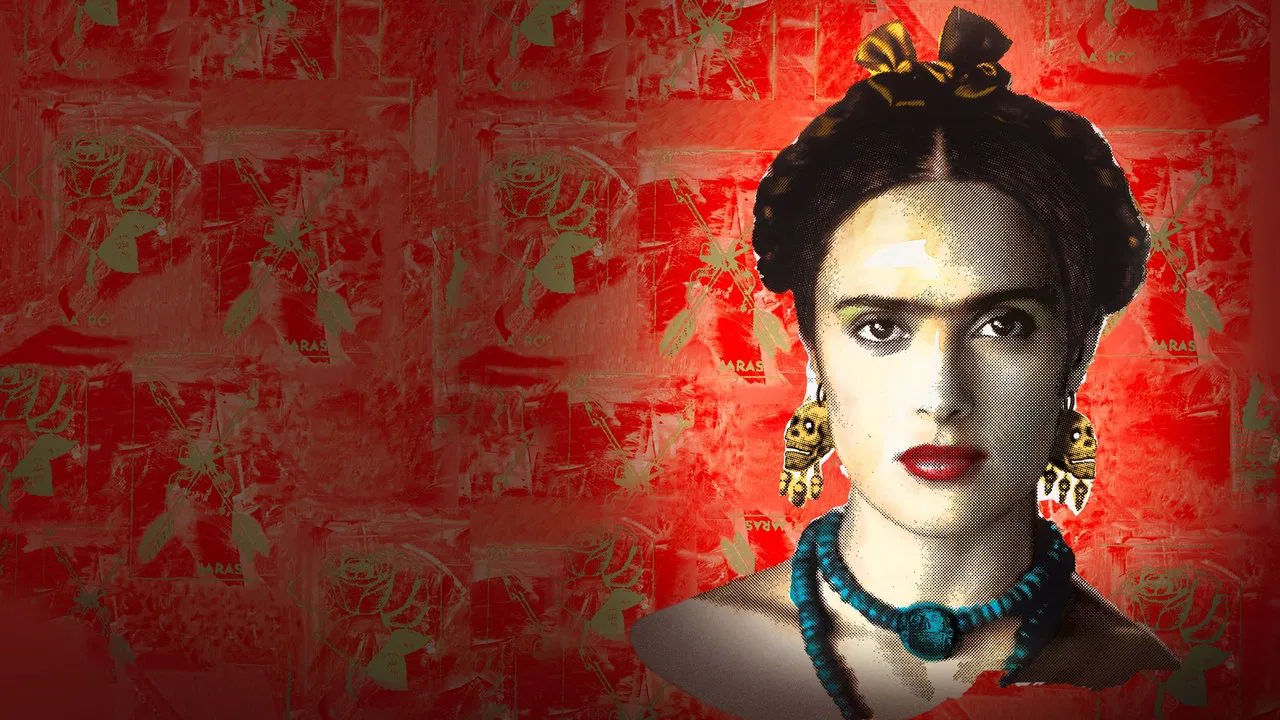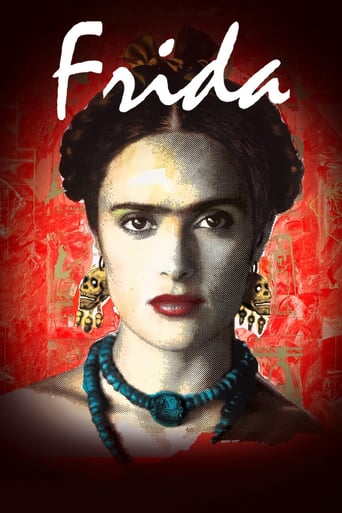

just watch it!
... View MoreBoring
... View MoreAll of these films share one commonality, that being a kind of emotional center that humanizes a cast of monsters.
... View MoreWhile it is a pity that the story wasn't told with more visual finesse, this is trivial compared to our real-world problems. It takes a good movie to put that into perspective.
... View MoreWatching Salma Hayek as young Frida did not help for a good start. She was really unconvincing. Overall I am not impressed with her acting and character. She, or more likely the director, failed to show Frida's ambitions, ideology and pain. We are reminded her having! ambitions through her 30-second dialogs with her father but never explaining what they are. We are reminded that she is in constant pain through her saying that she is a bunch of times but we never see it. She is depicted as a ever joyful, sexy woman, who is not a great artist but a spoiled and radical housewife. The Frida shown in the paintings throughout the movie and the Frida they have created are two completely different persons. Also the politics they somehow focused and spear a lot of time do not have any ground for the viewer.It is unfortunate that a movie inspired by a great artist, with such powerful cast is this unappealing.
... View MoreThis movie evokes David Lean's "Lawrence Of Arabia" in a sense, that both movies were not intended to be straight biographies of their respective historical figures. In fact, this movie even made me think of the "I Love Lucy" sitcom, with Diego Rivera as the buffoon to Frida Kahlo the straight woman.The movie starts with Frida Kahlo at age 18, just before she had the accident while riding a bus, which would cause her crippling injuries she would carry for the remainder of her life. She is given a canvas and paints by her family to occupy her while she initially recovers, and she adopts a surrealistic style, and later meets and marries already famous muralist Diego Rivera. They become left-wing radicals while living in high society, move to the United States where Rivera would try to paint his mural depicting Lenin in the Rockefeller Center, then move back when the project is cancelled and the mural destroyed. Both spouses have many extramarital affairs, though Diego gets upset when his wife has one with Leon Trotsky. (I saw the movie in the theater, and the audience all groaned in mockery when Diego complained to Frida about it.)Like I said, the movie is drama rather than biography; we see Frida, despite her sufferings, as strong and laughing at her many troubles. We don't see what moves her politically or artistically, but the movie is for entertainment and not education.
... View MoreFrida will always hold a special place in my heart. This film resonates with everyone in one way or another as it depicts the complex mixture of pain and beauty we all grapple with in life. Director Julie Taymor, best known for directing the stage show The Lion King, was brought on to this film in 2001 and it was a long time coming. In the late 80s, attempts of making a film about Frida Kahlo had failed as she was deemed 'unknown' and therefore her story, irrelevant. In the early 90s one of her self portraits was bought for $1.5million, the most any painting of Latin American origin had ever been sold for; this increased the value of her story and so many big names in Hollywood were voicing their intentions to make her biopic. The market was saturated with Frida, so nobody was interested until the hype died down and eventually Frida was made in 2002. I find it fascinating how money gives value to someone's story. Surely the story should speak for itself. Luckily for us, the film was made and the masses could connect with this tragic tale, lived nearly a century prior to it's making. Frida Kahlo (1907-1954) is an icon in feminism today. She didn't conform to gender norms - often wearing androgynous attire and being openly bisexual. Despite so much holding her back (her crippling illnesses, society's expectations of the woman's role, her disgrace of a husband) she flourished in the art world and was loved by critics of her time and today - a career driven woman. Her surrealist self portraits were unique and unlike anything else of it's time - a reflection of Frida herself. Painting was a way of expressing the anguish she felt, a victim of life, and her way of fighting back. She was a true fighter. What is striking about this powerful woman is that her vitality and spirit was never shattered, after a lifetime of being knocked down she never failed to get back up again, figuratively speaking. Fall down seven times, get up eight. I think this is because she had an outlet for her sorrow, somewhere to channel the grief of her very existence - her painting - leaving space in her life for love, joy, happiness, gratitude and forgiveness. Frida, played by Salma Hayek, was a cripple and lived a life of chronic physical pain. Everybody has a disability of sorts holding them back in life, be it physical, mental, emotional, circumstantial... That's why I think her story connects with everyone in some way or another. She is a glowing example of overcoming adversity and thriving, accepting life's grievances and using them as the fuel for your success and fulfilment. This film is needed in today's world, where we glorify perfection and expect 'happily ever after'. Her story is honest, grounded and a relief. The storytelling of the film isn't quite as profound as the story itself. I felt like an observer of her life, as if I was looking at one of her self-portraits trying to understand her state of mind. The film failed to tell the viewer how Frida truly felt and would have been better with a slower pace and more moments of quiet reflection and symbolism, as opposed to animation. I think that would have been a more honest portrayal of her state of mind and would have resonated with the viewer on a deeper level. Despite this, it was a good watch and swings the viewer through her highs and lows in a less delicate yet effective way. The quirky stop-motion animation didn't quite fit the traditional Latin American contextual style of the film; however, it reflected the off- beat protagonist who didn't quite fit in the context of her times. The score was in perfect harmony with the Latin American setting, and in perfect disarray with Hollywood's typical repertoire; it is no wonder it won an Academy Award. Similarly, the set-design, costumes and makeup was a visual masterpiece.After watching Frida, I am more in awe of her, more inspired by her story, and more mystified by who she was.
... View MoreIn my point of view, no Mexican painter was like Frida Kahlo. Aside from being my idol, just her life inspired me in many ways. Both, everything she suffered, as the strength and courage that characterized her. In this film, the image and life of Frida is reflected well, in my opinion, perfectly fine. How she dresses, which was something that identified her, like her famous eyebrow and mustache, everything was perfect. In this film, directed by Julie Taymor, is completely different from what you might expect from a "film / documentary" of the life of an artist such as Frida. By implementing the drawings of animated skeletons when she comes out of a coma, or when she imagines Diego as King Kong, among others, make even more original film. As I said, in my personal view this movie I qualify as excellent.
... View More